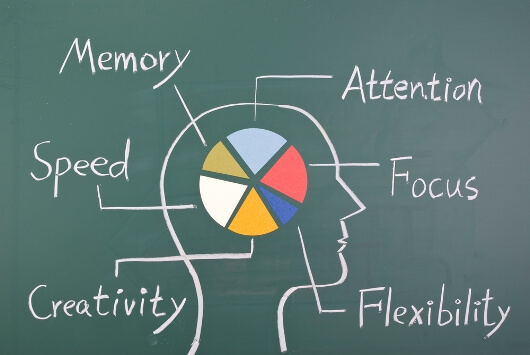
Humans are creatures of habit. Once we get into a rhythm, we're loathe to change things up. However, there's strong evidence to suggest that simply by doing things differently, you can boost your brain health. Others go so far as to suggest that opening yourself up to new cognitive activity can perhaps stave off certain forms of dementia (of which there are more than a dozen types), which is affecting an increasing number of Americans every year.
Before you balk at the mere prospect of doing things differently, check out the following easy - dare we say FUN - ways to get out of a rut and to start taking care of your brain's health.
Break Your Routine
Scientists have discovered an amazing series of life hacks to improve brain function. It all hinges on the fact that habitual actions - things we do by rote - require less and less brain power. By switching things up, the brain must compensate by creating new pathways and cells. If you drive the same way to work every day, mix things up by taking an alternate route. If you always go to the same grocery store, go to a different one. Use your non-dominant hand to brush your teeth. All of these activities can lead to a rapid and significant expansion of parts of the cortex, making cells stronger and more resistant to the effects of aging.
New Smells
Take a tour of your spice cabinet. Order collections of scented candles. Routinely vary your personal care products. Buy a new cookbook and try a new recipe every week. Begin your day by smelling something out-of-the-ordinary, then end your day the same. If you can connect new scents with an emotional meaning, you can stimulate different areas of the brain and naturally produce nerve-cell nutrients that improve memory.
Limit Your Binge Watching
In a 25-year study gauging the effects of binge watching, researchers note that people who watch more than three hours of TV score much more poorly on cognitive tests. In another study, binge-watchers reported higher levels of stress, anxiety and depression than those who were not. Same goes for the time spent staring at your phone. If you have a dog, take them for a walk along a completely new route. Or play a board game with the kids. There's a great big world out there that's not fictional, waiting for you!

Mental Stimulation
Switching your interaction with the world from passive to active can yield impressive changes in your brain. Rather than spending countless hours vegging, try on a new hobby or two. Crossword puzzles, sudoku or even a lecture series can stimulate new neural connections and the development of new cells, both of which contribute to mental elasticity. The best activities for your brain are ones that employ creative thinking and manual dexterity, so if you've ever wished you could draw or paint, now's the time to start learning!
Do All The Things
We've heard all the expert advice. All of what they've been telling us for years - don't smoke, don't drink to excess, exercise regularly, maintain an average blood pressure, get plenty of sleep, keep your blood-sugar and cholesterol levels in check - all of these can have a dramatic positive effect on your brain health. If you haven't been paying attention to these things, start taking steps beginning today.
Feed Your Head
If you're like most Americans, your diet could use some improvements. Walnuts, fish, olive oil, sage, blueberries, cocoa, tomato, broccoli, apples, spinach, black currants and pumpkin seeds all contain nutrients vital to brain health. To nourish your brain with a premium balance of omega-3's and 6's, look no further than Life's Abundance Fish Oil. Not only is it highly concentrated and ultra pure, research has shown that its consumption benefits cognitive performance due to its anti-inflammatory properties. Scientists believe that cognitive decline associated with minimal intake of omega-3’s may be a predictor of Alzheimer’s Disease. Furthermore, other studies have found a causitive link between deficiencies in omega-3’s and a number of serious psychological conditions, including depression, bipolar disorder, schizophrenia, ADHD and even substance abuse.
Make New Connections
Socialization is hard-wired into your brain. When we isolate ourselves, it can lead to negative effects not only in the way we feel, but also for brain health. By cultivating relationships with friends, co-workers and family, you'll actually be helping to lower your risk for dementia, lower your blood pressure and even extend your lifetime. Get out there and make some new connections!
Put most simply, all of these tips boil down to being open to embracing new things. And the benefits are undeniable. We encourage you to try these simple tips and to let us know your experience in the comments section below!
References
https://well.blogs.nytimes.com/2015/12/03/tv-may-be-bad-for-your-brain
https://apha.confex.com/apha/143am/webprogram/Paper335049.html
“Fish, meat, and risk of dementia: cohort study.” British Medical Journal, 2002; 325; 932-933.
"Plasma fatty acids are associated with normative variation in mood, personality and behavior." Abstract #1411. Presented at the 64th Annual Scientific Mtg of the American Psychosomatic Society, Denver, CO, March 1-4, 2006.
Hibbeln, J.R.. "Fish consumption and major depression." The Lancet, 1998; 351: 1213.
Hibbeln, J.R.. "Long-chain polyunsaturated fatty acids in depression and related conditions, in Phospholipid Spectrum Disorder." (Lancashire, England: Marius Press, 1999), pp. 195-210.
https://www.health.harvard.edu/mind-and-mood/12-ways-to-keep-your-brain-young
https://www.businessinsider.com/brain-exercises-that-make-you-smarter-2018-1
“Dietary intake of fatty acids and fish in relation to cognitive performance at middle age.” Neurology. 2004 Jan 27;62(2):275-80.